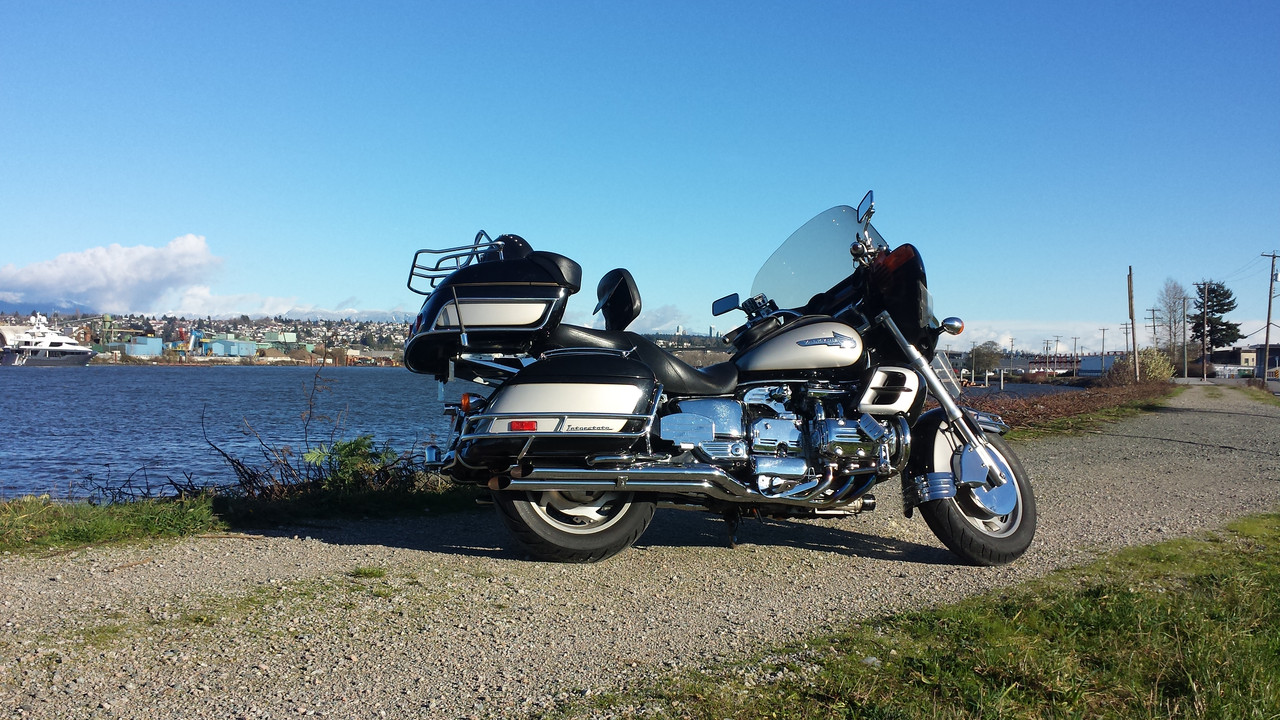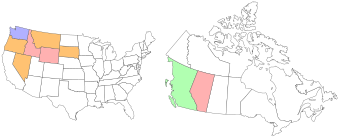Tfrank59
Member
    
Posts: 1364
'98 Tourer
Western Washington

|
 |
« on: April 20, 2016, 12:16:56 PM » |
|
I know that you're supposed to check your tire pressure cold and, if it spikes up when hot you don't bleed it back down, but what if it's spiking 12 psi as mine has in the past week or so – we're having a heatwave in Seattle. It's a little scary when I see my rear tire up over 50 psi in the hot afternoon – it is tempting to bleed it down to 42. I'm sure you guys got lots of opinions on this  |
|
|
|
|
 Logged
Logged
|
-Tom
Keep the rubber side down. USMC '78-'84
'98 Valkyrie, ‘02 VTX 1800, '96 Royal Star, '06 Drifter, '09 Bonneville, '10 KTM 530, '04 XR 650, '76 Bultaco, '81 CR 450, '78 GS 750...
|
|
|
|
Fazer
|
 |
« Reply #1 on: April 20, 2016, 12:31:04 PM » |
|
I'm no expert, although I lived in Akron (rubber capitol of the world) for many years. I would not see a problem with this as long as you re-inflate when the temps return to more normal range. I'm sure others will opine....
funny story--I have an acquaintance that used to ride with the Iron Horsemen. They made a run to the west coast one summer on their Harley choppers. The ride was so rough, the ones with hard tales kept letting air out of the tires as they rode thru the desert. Once they got into cooler temps the all had flat tires.
|
|
|
|
|
 Logged
Logged
|
Nothing in moderation...
|
|
|
hubcapsc
Member
    
Posts: 16817
upstate
South Carolina
|
 |
« Reply #2 on: April 20, 2016, 12:31:24 PM » |
|
I think it is normal to go up between 5 and 10 lbs... I
noticed it one day when I checked my air pressure again
after 45 or so minutes, and it was not a hot day...
Anyone else see the same thing?
-Mike
|
|
|
|
|
 Logged
Logged
|
|
|
|
|
Jess from VA
|
 |
« Reply #3 on: April 20, 2016, 12:34:19 PM » |
|
Set it cold, ignore it hot. You don't think the mfgrs have legal staff advising on what is printed on the sidewall for MAX PSI? That (cold check) max psi on the sidewall should take care of any normal high temps that may come during operation. (not the burnout pit)
I might be concerned in Death Valley at 130 plus and running high speeds.
Also, I never heard anyone report a bike tire being 12 over a cold check setting. 3-5 is more the norm. Not that I check mine hot.
Do what you want. I have kept my tires within 1-4 of MAX PSI for many years (cars too), and never had an issue (blowout, failure) on quality tires. However, I do not try to get the last lousy 500-1000 miles out of any tires. Once going sideways (then a tank slapper) into an on ramp was enough for me (on a hot nearly treadless tire). I only went about 40 miles that day and thought.... what could go wrong?
|
|
|
|
« Last Edit: April 20, 2016, 12:37:16 PM by Jess from VA »
|
 Logged
Logged
|
|
|
|
|
msb
|
 |
« Reply #4 on: April 20, 2016, 01:06:35 PM » |
|
I run my tires (both MC tires) at 4-5 psi over recommended pressure (cold), and check them regularly. They definitely increase to the mid - high 40's on long runs in warmer weather, but I've never had any issues. Next morning they're usually right where I had them set cold previously. I would assume that this increase in psi is taken into consideration by manufacturers when designing the tires.
|
|
|
|
|
 Logged
Logged
|
Mike
'99 Red & Black IS
|
|
|
Daniel Meyer
Member
    
Posts: 5493
Author. Adventurer. Electrician.
The State of confusion.

|
 |
« Reply #5 on: April 20, 2016, 02:01:59 PM » |
|
Tire pressure is set, measured, or adjusted cold. The spike up while hot is expected and accounted for.
|
|
|
|
|
 Logged
Logged
|
CUAgain, Daniel Meyer  |
|
|
|
WintrSol
|
 |
« Reply #6 on: April 20, 2016, 02:05:58 PM » |
|
It should be noted that the more water vapor there is in the tire, the higher the hot pressure will be. If you use air from a dryer - the kind paint shops use - or from a nitrogen generator, it will be very dry, and the pressure won't change as much. I don't think it matters much if you're not racing (or riding like a racer), but I use dried air in my autocross tires (sports car), so I can control the pressures more closely. Since I have the dryer, I use it in all my vehicle tires.
|
|
|
|
|
 Logged
Logged
|
98 Honda Valkyrie GL1500CT Tourer
Photo of my FIL Jack, in honor of his WWII service
|
|
|
|
BobB
|
 |
« Reply #7 on: April 20, 2016, 02:26:23 PM » |
|
I have a TPMS installed in my Tourer, and I have seen hot pressures rise 5 to 8 psi above the cold settings. I don't think you have have a problem and would not deflate when the tires are hot, they will just get hotter...
|
|
|
|
|
 Logged
Logged
|
|
|
|
|
Bighead
|
 |
« Reply #8 on: April 20, 2016, 02:52:40 PM » |
|
Only ever check mine HOT when a problem is suspected. Other wise only check them COLD.
|
|
|
|
|
 Logged
Logged
|
1997 Bumble Bee
1999 Interstate (sold)
2016 Wing
|
|
|
|
Jess from VA
|
 |
« Reply #9 on: April 20, 2016, 03:15:24 PM » |
|
I have a TPMS installed in my Tourer, and I have seen hot pressures rise 5 to 8 psi above the cold settings. I don't think you have have a problem and would not deflate when the tires are hot, they will just get hotter...
Very good point. |
|
|
|
|
 Logged
Logged
|
|
|
|
Tfrank59
Member
    
Posts: 1364
'98 Tourer
Western Washington

|
 |
« Reply #10 on: April 20, 2016, 04:24:56 PM » |
|
Okay, thanks for the feedback. The only real concern I had was that I'm running my rear at 42 psi (cold) and that's already like 5 lbs over what the mfg. recommends. I was thinking no sweat but just wanted to run it by ya.
|
|
|
|
|
 Logged
Logged
|
-Tom
Keep the rubber side down. USMC '78-'84
'98 Valkyrie, ‘02 VTX 1800, '96 Royal Star, '06 Drifter, '09 Bonneville, '10 KTM 530, '04 XR 650, '76 Bultaco, '81 CR 450, '78 GS 750...
|
|
|
gordonv
Member
    
Posts: 5766
VRCC # 31419
Richmond BC
|
 |
« Reply #11 on: April 20, 2016, 05:54:10 PM » |
|
Okay, thanks for the feedback. The only real concern I had was that I'm running my rear at 42 psi (cold) and that's already like 5 lbs over what the mfg. recommends. I was thinking no sweat but just wanted to run it by ya.
I also agree with the above. But then WHY are you over inflating your tire above the mfg MAX psi? In your case, I would lower it to the max psi printed on the tire. At least during the warmer months from April to Oct. |
|
|
|
|
 Logged
Logged
|
1999 Black with custom paint IS   |
|
|
|
Jess from VA
|
 |
« Reply #12 on: April 20, 2016, 06:07:07 PM » |
|
Remember, the mfgrs recommended pressure is ONLY for the tire that comes on the bike new (not all tires of the same size). And with cruisers, that is usually a cheap-end tire. Wasn't the OE Valk tire a D401, and didn't they wear out pretty quickly, and weren't they discontinued after a couple years? If when you replace it with Metz, Avon, Michelin or other better tire, sticking with the always low-side recommended pressures is a great way to only get 2/3's the life you should out a good tire.
As soon as I get a better tire (on a bike new to me), I immediately set pressure halfway between what the manual recommends and the MAX PSI on the sidewall. I have always gone up a bit after that.
IMHO, not only are the OE tires usually mediocre (read what they've been writing about the OE 1800 Valk tires), but the mfgrs like to recommend lower pressures because they think it stops a bit better, and because when new it gives a more pleasant/cushy ride (which helps with sales). None of them care if you need new tires every 6-7K miles.
But every man ought to do what he thinks is right.
Gordon, a good number of bike tires have 42-4 as max psi, but I don't recall any for valk with a max psi under 42. But I agree with you, I get close to max psi on all my tires, but I never meet or exceed it
|
|
|
|
« Last Edit: April 20, 2016, 06:12:19 PM by Jess from VA »
|
 Logged
Logged
|
|
|
|
|
The emperor has no clothes
|
 |
« Reply #13 on: April 20, 2016, 07:18:38 PM » |
|
Okay, thanks for the feedback. The only real concern I had was that I'm running my rear at 42 psi (cold) and that's already like 5 lbs over what the mfg. recommends. I was thinking no sweat but just wanted to run it by ya.
You are fine. It gets up to 128* here at times. Never had an issue. |
|
|
|
|
 Logged
Logged
|
|
|
|
gordonv
Member
    
Posts: 5766
VRCC # 31419
Richmond BC
|
 |
« Reply #14 on: April 21, 2016, 05:57:43 PM » |
|
Remember, the mfgrs recommended pressure is ONLY for the tire that comes on the bike new (not all tires of the same size). And with cruisers, that is usually a cheap-end tire. Wasn't the OE Valk tire a D401, and didn't they wear out pretty quickly, and weren't they discontinued after a couple years? If when you replace it with Metz, Avon, Michelin or other better tire, sticking with the always low-side recommended pressures is a great way to only get 2/3's the life you should out a good tire.
No, we are referring to the Max PSI printed on the side of the rubber tire. Not the max PSI printed in your owners manual. The MAX PSI printed on the tire, IS THE MAX PSI cold, for that tire. It has no baring on what original tire was on the rim, or max printed in the manual. Who can say there OEM tire of 15 years ago, is still the same max psi on the side. |
|
|
|
|
 Logged
Logged
|
1999 Black with custom paint IS   |
|
|
|

